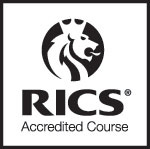
BSc(Hons) Quantity Surveying and Commercial Management (with Foundation Year)
This course is open for applications
Page last updated 4 December 2023
Introduction
Gain a strong start to your professional career with accreditation from the Chartered Institute of Building (CIOB) (subject to conditions), Royal Institution of Chartered Surveyors (RICS) and Chartered Institute of Civil Engineering Surveyors (ICES).
Why study quantity surveying and commercial management?
Managing finance and costs effectively is important throughout the building lifecycle, from inception to completion.
As we build new developments and manage existing ones, demand increases for professionals with the knowledge and skills to manage this process.
The building industry needs people with a good understanding of the commercial aspects of development and construction.
Why UWE Bristol?
BSc(Hons) Quantity Surveying and Commercial Management is a degree that reflects the needs of modern industry.
It's accredited by the Chartered Insitute of Building (CIOB) (subject to conditions), the Royal Institution of Chartered Surveyors (RICS) and the Chartered Institute of Civil Engineering Surveyors (ICES) putting you on course for full membership.
This course is available on a full-time or part-time basis, so you can boost your career prospects if you're already working in the industry.
Develop your knowledge and a range of skills needed for quantity surveying and commercial management. Learn how to place these in a wider business context.
Get free access to RICS events and workshops promoting best practice. Attend regular presentations from visiting professionals, academics and past students so you stay up-to-date with industry challenges.
Learn about different careers and approaches on day and field trips. Gain valuable skills on your placement, which may count as part of the professional development you need to achieve Chartered status.
Graduate ready to take advantage of new opportunities in the construction, civil engineering and property industries.
Where can it take me?
On graduation, you can go into a choice of careers.
These include professional quantity surveying, commercial management, project and facilities management, value and risk management and procurement management.
Structure
Content
The optional modules listed are those that are most likely to be available, but they may be subject to change.
Year zero (foundation year)
You will study:
- Building a Professional
- Built Environment Futures
- Context of Design and development
- Foundation Engineering
- Foundation Year project.
You normally need to pass your foundation year before going into year one.
Year one
You will study:
- Quantity Surveying Practice and Procedures
- Law, Economics and Management
- Environmental Physics and Materials
- Construction Technology and Services.
Year two
You will study:
- Quantity Surveying Project
- Procurement and Contract Practice
- Construction Technology and Building Services
- Development and Design Economics
- Professional Practice for the Built Environment.
Placement year (if applicable)
If you study on the five year (sandwich) course, you'll spend a year away from the University on a work placement after year two.
See the Placements and Fees sections for more information.
Final year
You will study:
- International Cost Management
- Commercial Management
- Innovation and Professionalism
- Dissertation.
Plus, one optional module from (if you haven't completed a placement year):
- Collaborative Practice.
The University continually enhances our offer by responding to feedback from our students and other stakeholders, ensuring the curriculum is kept up to date and our graduates are equipped with the knowledge and skills they need for the real world. This may result in changes to the course. If changes to your course are approved, we will inform you.
Learning and Teaching
Our tutors provide a friendly, collaborative environment for learning. They're actively engaged in research or professional practice so you learn directly about the latest academic and business developments.
Learn through a mix of tutor-led and face-to-face classes, student-led and independent study, online study, group projects and by supporting each other's learning.
We encourage you to do formative work to prepare for assessments, e.g. practice tests. This doesn't count towards your marks but feedback will improve your performance.
We can give you support if you have difficulties with numeracy, IT, literacy or study skills.
Develop your communication and presentation skills, IT and numeracy skills, and project and time management skills throughout. Your improved problem solving, critical thinking, analysis, evaluation and innovation skills will help you stand out as a graduate.
Explore relevant legal, economic, management and technology principles and enhance your understanding of the commercial aspects of development and construction.
Learn how to measure and evaluate the costs associated with construction projects and apply your skills and knowledge to real projects and problem-solving scenarios. Question and critique UK practice and procedures and make comparisons with European and international practice.
Get expert help developing your CV and preparing for interviews in our final year Job Bootcamp.
Improve your practical skills through roleplay and employer visits to ensure you graduate ready to succeed in the workplace.
See our full glossary of learning and teaching terms.
Approximate percentage of time you'll spend in different learning activities*:
| Year | Scheduled learning and teaching study | Independent study | Placement study |
|---|---|---|---|
| 0 | 27% | 73% | 0% |
| 1 | 25% | 75% | 0% |
| 2 | 24% | 76% | 0% |
| 3 | 18% | 78% | 4% |
*Calculated from compulsory and optional modules (where applicable) each year
Showcase your work
In your final year, showcase your work to prospective employers and the public at the annual degree show.
Study time
Lectures, workshops, seminars, group project work and tutoring make up 12 hours of contact time each week.
We expect you to spend at least another 24 hours studying independently.
Assessment
You should expect a mix of coursework and seen and unseen exams, which assess what you know and can do and help you develop the confidence and skills that employers value.
Coursework may include essays, reports, portfolios of drawings or sketches, calculations, lab reports, presentations and projects. In your final year you'll complete a dissertation.
While most coursework involves individual submissions, some modules require teamwork.
Learn more about assessments.
Approximate percentage of marks awarded by each assessment method*:
| Year | Written exam assessment | Coursework assessment | Practical exam assessment |
|---|---|---|---|
| 0 | 38% | 57% | 5% |
| 1 | 50% | 50% | 0% |
| 2 | 50% | 50% | 0% |
| 3 | 22% | 75% | 3% |
*Calculated from compulsory and optional modules (where applicable) each year
Features
Professional accreditation
This course is accredited by the Royal Institution of Chartered Surveyors (RICS) and Chartered Institute of Civil Engineering Surveyors (ICES).
UWE Bristol also holds Chartered Insitute of Building (CIOB) Accredited Centre Status during the period 2022-2027 and this course is CIOB Accredited (subject to conditions) during the period 2022-2027, having been judged to meet the CIOB Education Framework. Prospective members holding these qualifications have full academic exemption and once they have gained three to five years' relevant work experience may enter CIOB membership as an applicant to progress towards Chartered Membership without the requirement for an Individual Assessment.
This course is available on a full-time or part-time basis, so you can boost your career prospects if you're already working in the industry.
Placements
Students who get work experience tend to graduate with better degrees. Experience also hones your skills, industry knowledge and professional network, making you highly employable when you graduate.
If you choose the five year (sandwich) course, you'll spend a year away from the University on a work placement after Year two.
Students have worked on placements with some of the top 10 construction contractors and cost consultancy firms in the UK. The majority were offered a position with their placement employer upon graduating.
Fieldwork
Regular site visits and industry field trips in and around Bristol help you consider construction related topics in the field. We also arrange residential field trips, which are subsidised by the School.
Year one
In recent years, the Bristol orienteering exercise takes place during induction week. Local site visits to construction projects may be arranged subject to availability throughout the academic year.
Final year
An international field trip, usually to Berlin, where you will visit a construction site and hear presentations from local industry.
Study facilities
Learn in modern, well-equipped facilities within the School, including award-winning design studios.
Study and collaborate on group assignments in our dedicated Hive lounge and open computing area.
Develop skills in computer-aided design (CAD), project management and building information modelling (BIM) on industry standard software.
Access industry leading resources, specialist journals and publications through UWE Bristol's online portal.
Visualise two-dimensional drawings using modern industry standard drawings and a three-dimensional 'fly through'.
This mix of traditional and highly creative learning environments enables you to learn essential knowledge and real-world skills, standing you in good stead for your professional career.
Learn more about UWE Bristol's facilities and resources.
Take a Virtual Tour of the Construction, Property and Surveying facilities and see what's on offer here for you.
Life
Accommodation
An excellent range of options for all of the Bristol campuses and the city centre.
Bristol
A stunning city for student living with all the qualities to make you want to stay.
Sports, societies and activities
There is more to your experience here than study. Choose to make the most of it and try new things.
Health and Wellbeing
We provide support in the way you need it.
Campus and facilities
Discover our campuses and the wealth of facilities provided for our students.
Careers
Careers / Further study
A shortage of professionals with this combination of knowledge and skills means you'll be in high demand with employers.
You'll have a wide choice of careers to go into. These include professional quantity surveying, commercial management, project and facilities management, value and risk management, procurement management, arbitration and dispute resolution, capital allowances and tax consultancy, property development, construction manufacturing, and supply.
Our graduates have gone on to work for construction partners including Aecom, Interserve, Wilmott-Dixon and Balfour Beatty. Others work in the public sector, specifically with local authorities.
Get inspired
Our award-winning careers service will develop your employment potential through career coaching and find you graduate jobs, placements and global opportunities.
We can also help find local volunteering and community opportunities, provide support for entrepreneurial activity and get you access to employer events.
Visit our employability pages to learn more about careers, employers and what our students are doing six months after graduating.
See also
Fees
Full-time; Sandwich course
Indicative Additional Costs
Supplementary fee information
Your overall entitlement to funding is based on how long the course is that you're registered on. Standard funding is allocated based on the standard number of years that your course lasts, plus one additional year.
You'll apply for funding each year that you study and Student Finance will take into account how long the course is in each year that you apply. So if you register for the five year course and then transfer to the four year course, the number of years you can apply for funding will change. Student Finance will reassess your funding based on how many years you have been in study, not just those years for which you received student finance.
Always seek advice before taking any action that may have implications for your funding.
The honours degree is 360 credits in total. Part-time students generally study between 60 (15 credits x 4) and 90 (15 credits x 6) each year and pay annually for credits taken in that year.
As a part-time UK or EU student you may be entitled to a fees loan from the government.
Find more information on our part-time funding pages.
There are also sponsorship options for employers.
Additional costs
Additional costs are for items you could need during your studies that aren't covered by the standard tuition fee. These could be materials, textbooks, travel, clothing, software or printing.
Entry
Typical offers
- Tariff points: 72
- Contextual tariff: See our contextual offers page.
- GCSE: Grade C/4 in English and Mathematics, or equivalent.
- A-level subjects: No specific subjects required.
- EDEXCEL (BTEC) Diploma: No specific subjects required.
For information on required Guided Learning Hours please see our minimum entry requirements page.
- Access: No specific subjects required.
- Baccalaureate IB: No specific subjects required.
- Irish Highers: No specific subjects required.
- T Levels: No specific subjects required.
Entry requirements
If you exceed the entry requirements you may be eligible for BSc(Hons) Quantity Surveying and Commercial Management.
International Applicants
If you are an international student your recommended route of study for this degree is through our International College, which upon successful completion to the required level and with good attendance, guarantees entry to year one of the degree.
Read more about entry requirements.
How to apply
- Read more about undergraduate applications
- Read more about international applications and key international deadline dates.
For further information
- Email:
UK applicants
Admissions@uwe.ac.ukInternational/EU applicants
International@uwe.ac.uk - Telephone:
UK applicants
+44 (0)117 32 83333International/EU applicants
+44 (0)117 32 86644


